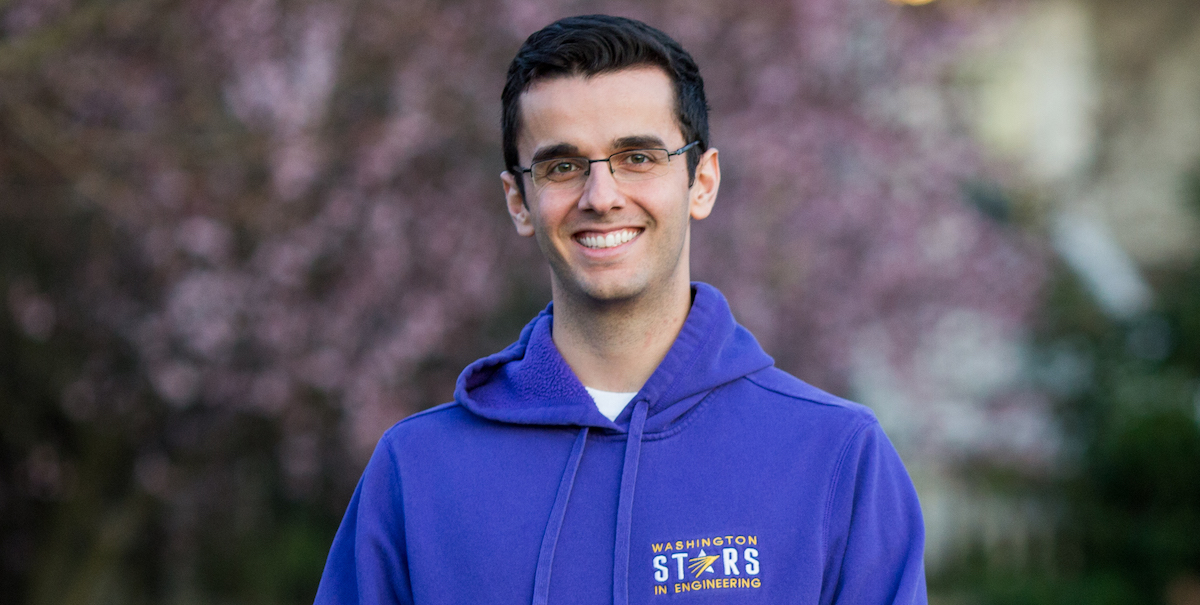Graduate Student
Level: Ph.D.

How did you become interested in engineering and of UW A&A in particular? Tell us more about your pathways leading you here.
When I was in 7th grade I joined my school's Science Olympiad team. There were several events in this competition, but the one that immediately captivated me was the "Wright Stuff" event. In this event, you built a rubber band powered balsa wood airplane with the goal of flying inside a gym for as long as possible. I obsessed over designing and testing different wing shapes and sizes to build the best possible airplane. From that moment on I wanted to study aerospace engineering.
I went on to study at the University of Michigan for my undergrad. While I was there, I discovered my passion for computation and its applications to engineering. After finishing my degree, I decided to continue on to graduate school to delve more into my interests of fluid mechanics and computation.
When applying to graduate schools I had three criteria: 1. I wanted to work in a lab that developed its own computational fluid dynamics code and employed high performance computing, 2. I wanted to live in a major city, and 3. I wanted to live in an area with abundant outdoor activities. My advisor Dr. Ferrante’s research group, the Computational Fluid Mechanics Lab, was the perfect fit for the first criterion. My experience living in Seattle has more than fulfilled my expectations of the second two criteria.
Tell us about your interesting activities and research lab experience.
Part of the reason I started a Ph.D. was my desire to be a professor in the future. Before coming to the UW, I hadn’t had the opportunity to teach. I’ve been very lucky to work as a teaching assistant and instructor for the STARS program since the second year of my degree. The STARS program supports engineering and computer science students from low-income, first-generation, and underserved backgrounds in navigating the transition to college-level courses. I’ve had the privilege to develop my own curriculum and work with extremely engaged students in introductory math and physics courses. This position has affirmed my passion for teaching and helping students learn.
My research involves studying the fundamental physical mechanisms present in droplet-laden turbulent flows using direct numerical simulation. In order to do this, I develop my research group’s code and run large-scale simulations, which I then post-process to discover physical mechanisms related to the interaction of turbulence and droplet interfaces.
The computational power required for these simulations is so large that we must use remote supercomputers like SDSC’s Comet and TACC’s Stampede 2. The simulations I run on these supercomputers typically take around 2 days to complete, but they would take years to run on a typical laptop computer. Utilizing some of the most powerful supercomputers in the world while contributing new understanding of flow physics has been exciting and rewarding.
What do you enjoy most about A&A?
I have felt supported by the department and my peers throughout my time as a student in A&A. I have been nominated and selected for awards such as the AIAA 20 Twenties and the Sustainable Horizons Institute’s SIAM CSE17 Broader Engagement Program. I would not have thought to apply to these opportunities on my own, but the department reached out to me and encouraged me to apply and supported me throughout the process. Before moving to Seattle, I only had one friend living in the city, and I was worried about building a support system in a new city. In my experience, the culture between graduate students in the department is very collaborative and supportive and I have built a strong support system in my time here.
What advice do you have for prospective students?
When choosing where to go to graduate school, meet with your prospective advisors and choose someone with whom you can envision a positive working relationship. You will be much happier in your graduate school experience if you have an advisor who pushes you to work while keeping you motivated and excited. In addition, consider what aspects of life outside of work and study are important to you; make sure that resources are available to satisfy your non-academic needs and desires wherever you choose to study.